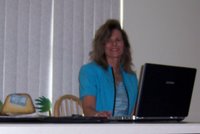The dreaded agent pitch. Those of you who have ever attended a writers’ conference know what I’m talking about. When you have ten minutes or less to convince an agent, face-to-face, to take you on. Or at least to ask for sample chapters and a synopsis of your latest book. You have to convince someone you’ve never met that you’re a good enough writer and have an interesting enough story you deserve to be represented, published and eventually go on to fame and fortune.
I’ve had three agents in the course of my writing career. None ever sold any of my work. I have five books published. Three of them were published by major New York houses. But I’m a little like “Crash” Davis in
Bull Durham. I’ve been to The Show, but got sent down to the minors. I want one more shot at the bigs. To do it, I’ll need a break-out book. I know I have one in me. Maybe the one I’m working on.
Last weekend, I attended "Murder In The Grove" in Boise. Participated on a panel, sat at an author’s table during a signing at Barnes & Noble (and watched people line up in front of Anne Perry). And pitched an agent.
I prepared ahead of time. Sent in the first 10 pages of my WIP. Worked with Mary Buckham on my pitch. First thing the big-name New York agent did was ask me if I’d attended the first panel of the day, and then made me feel like a truant school-boy when I said I’d missed it due to a previous appointment. Next thing she said, pulling out the polished, brilliant opening to my latest novel, was, “Weather report.” Seeing my confused expression, she patiently (well, patient in a New York fashion) explained that novice writers always make the mistake of describing the weather instead of telling the story. Then she proceeded to read from the first page of my book.
“It’s obvious you can write,” she said, “but what’s the story about.” I launched into my 25-word pitch. She said, “Now that’s a good story. What do you want to do with it?” I told her I wanted it to be my break-out book. “So what’s wrong with it?” she said. “What’s holding you back?” Slowly comprehending her meaning, I said tentatively, “I’m not telling the story?”
She nodded, smiled sweetly (looking as if she wanted to pat me on the head for being so smart) and then proceeded to tell me all the other reasons the book would never work as is (based on 10 pages and my 25-word pitch). Ouch!
The thing is, I know she’s right. I don’t think of myself as a novice writer after five books, but I still make novice mistakes now and then. And an outside set of eyes often can offer constructive criticism.
The brilliant opening? You can read it in my last blog or on my web site. When I fix it, I’ll post a version incorporating the agent’s suggestions and let you decide if she was right.
Mike Sherer
www.emersonwardmysteries.com



